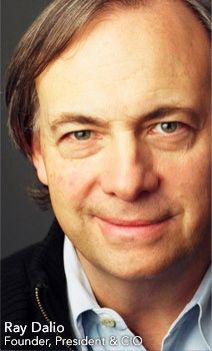Second largest hedge fund in the world practices radical truth

The president and founder the world's second largest hedge fund is a big believer in his set of excellence and management principles – including the controversial idea of radical truth – and credits the practice of them with giving his firm a competitive advantage.
According to the latest figures published by Pensions & Investments, Bridgewater Associates is the second largest hedge fund in the world, with $43.6 billion under management at the end of 2009, behind J.P. Morgan's $53.5 billion.
Bridgewater Associates was founded by Ray Dalio in 1975 out his apartment in Manhattan. Since then, money has poured in from investors and Dalio has provided them with consistent, low double-digit returns.
Along with the pursuit of uncorrelated returns and the refusal to use excessive leverage, Dalio credits his firm's success and longevity to his set of excellence and management principles.
In a document authored by Dalio titled “Principles,” he stated that because the world “changes so quickly and in ways that can’t possibly be anticipated far in advance,” the key to long term success and competitiveness is “great people with a great culture.”
Great People
Dalio sees people in terms of values (what they deeply believe in), abilities (how they think and behave), and skills (what they have learned).
He believes the most important trait for employees is the belief in the “intense pursuit of truth and excellence” and the “rapid improvement of themselves and Bridgewater.”
Indeed, Dalio said that the “overriding objective at Bridgewater is excellence, or more precisely, constant improvement.”
Great Culture
While his belief for personnel is not too out of the ordinary, his belief for culture is rather extreme.
Dalio believes that grasping the reality is essential to achieving excellence. Therefore, he advocates the controversial practice of radical truth and radical openness, which involves directly criticizing people and pointing out their weakness.
The draw back, said Dalio, is hurt egos. “Most people like compliments and agreement, and they dislike criticisms and conflict,” he admitted.
However, he believes the benefits of radical truth allows Bridgewater and its employees to “evolve....at a much faster pace than they would otherwise.”
He believes the practice of inviting criticisms and challenges to both individuals and processes, and then debating them openly and logically, facilitates evolution and drives Bridgewater towards excellence.
In addition, he claims that radical truth eliminates office politics, hidden agendas, and petty gossiping. People will also know that no matter what their position, their ideas will be fairly assessed.
“These principles...have produced radical success and satisfying, long-term relationships at Bridgewater for 35 years,” said Dalio.
He believes that “having a more conventional culture...would produce more conventional results and impede our mission to get at truth and excellence.”
Dalio added that “there has been virtually no disagreement on the validity of these principles by people who have probed them.”
However, online publication Dealbreaker quoted an ex-employee of Bridgewater who called the principles “pretty cult-ish, as is the culture of the whole company.”
This person also described Bridgewater's meetings, often recorded and then distributed company-wide, as the “public shaming and the demolition of people.”
At one meeting in particular, COO Hope Woodhouse was “shredded in front of the management committee” and “brought to the point of crying.” The recording was then sent out to the whole company.
This individual also said that 360-degree feedback meetings have become “everyone’s chance to totally dig on and destroy other individuals and say whatever things all year you’ve hated about people.”
Email Hao Li at hao.li@ibtimes.com
Click here to follow the IBTIMES Global Markets page on Facebook.
Click here to read recent articles by Hao Li.
© Copyright IBTimes 2024. All rights reserved.




















